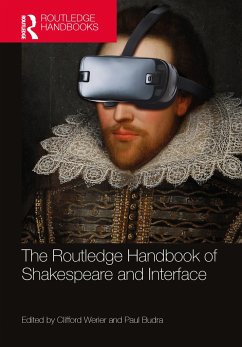The Routledge Handbook of Shakespeare and Interface provides a ground-breaking investigation into media-specific spaces where Shakespeare is experienced. While such operations may be largely invisible to the average reader or viewer, the interface properties of books, screens, and stages profoundly mediate our cognitive engagement with Shakespeare.
This volume considers contemporary debates and questions including how mobile devices mediate the experience of Shakespeare; the impact of rapidly evolving virtual reality technologies and the interface architectures which condition Shakespearean plays; and how design elements of hypertext, menus, and screen navigation operate within internet Shakespeare spaces. Charting new frontiers, this diverse collection delivers fresh insight into human-computer interaction and user-experience theory, cognitive ecology, and critical approaches such as historical phenomenology. This volume also highlights the application of media and interface design theory to questions related to the medium of the play and its crucial interface with the body and mind.
This volume considers contemporary debates and questions including how mobile devices mediate the experience of Shakespeare; the impact of rapidly evolving virtual reality technologies and the interface architectures which condition Shakespearean plays; and how design elements of hypertext, menus, and screen navigation operate within internet Shakespeare spaces. Charting new frontiers, this diverse collection delivers fresh insight into human-computer interaction and user-experience theory, cognitive ecology, and critical approaches such as historical phenomenology. This volume also highlights the application of media and interface design theory to questions related to the medium of the play and its crucial interface with the body and mind.









